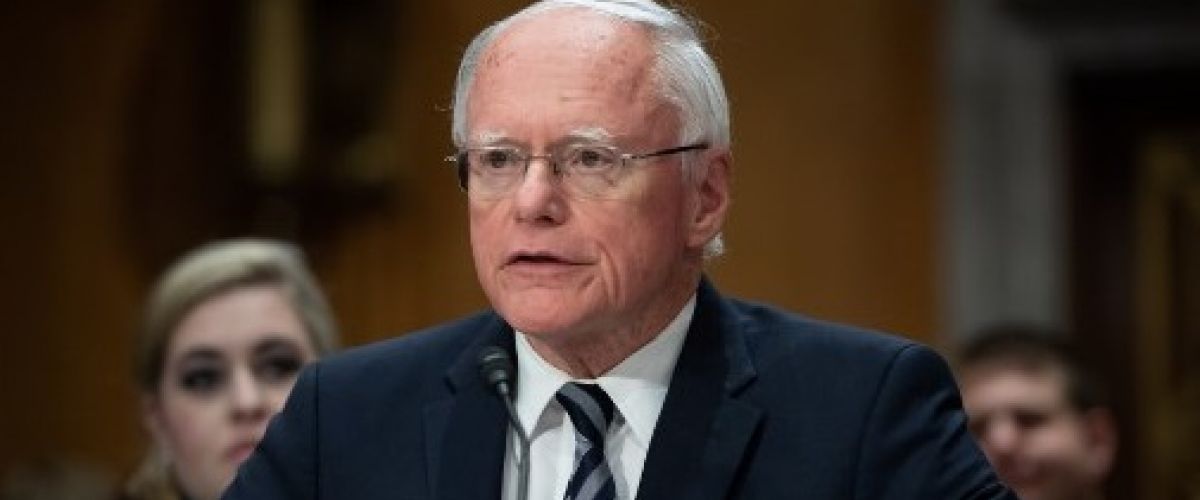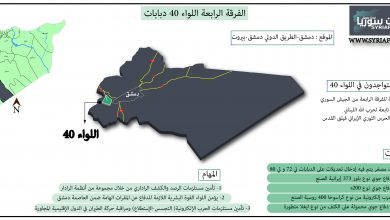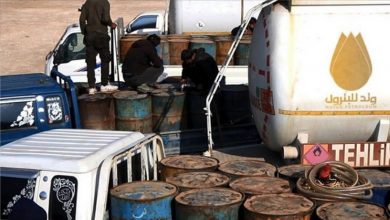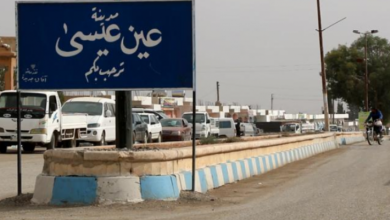US Envoy to Syria: ‘No change in troop presence in Syria’ whether Biden or Trump wins

By Will Christou
November 02, 2020
First published on: https://syriadirect.org/
AMMAN — On October 30, Syria Direct reporter Will Christou interviewed the US Special Representative for Syria Engagement and Special Envoy to the International Military Intervention against ISIS, Ambassador James Jeffrey.
Though Ambassador Jeffrey was careful not to speculate on the actions of future administrations, he expected “no change” in troop presence in Syria, nor in sanctions policy or the US stance towards Iran’s presence in Syria, regardless of whether Donald Trump or Joe Biden wins the US election on November 3.
This statement is surprising, given speculation that if Trump should win a second term, he might once again attempt to pull US troops out of northeast Syria, as he did twice before. It also runs counter to establishment advocates of Biden, who hoped that his administration would bring a redoubled commitment to the US’s local anti-ISIS Coalition partner, the Syrian Democratic Forces (SDF).
Ambassador Jeffrey said that based on his experience in the Obama administration, he would not imagine any change in the core demands of current regional Iran policy in the possibility of a Biden presidency.
He also reiterated the State Department’s demand that Turkey respect the post-Operation Peace Spring ceasefire in northeast Syria, saying that despite Turkish President Erdogan’s recent comments to the contrary, the US has seen “no sign of Turkish preparation for a military movement.”
He re-confirmed the US position that a political solution to the Syrian crisis “that reflects the will of the UN Security Council Resolution 2254 is absolutely necessary,” and expressed frustration that Russia has so far not pushed Assad to re-engage with the political process.
In an effort to push Assad to the negotiating table, the US has sanctioned a number of individuals with ties to the regime. Ambassador Jeffrey also claimed that the mere threat of secondary sanctions has prevented foreign investment and international commercial cooperation with the Assad regime, though none have been applied under the Caesar Act.
Whether or not US sanctions on the Assad regime have the ability to compel the Assad regime to stop human rights abuses is the subject of fierce debate. There is also significant disagreement over the extent of impacts that sanctions have had on the living conditions of Syrian civilians, who are currently experiencing the worst economic crisis since the Syrian revolution began.
However, regardless of who wins the US election on November 3, the current US Syria policy “will continue” with bi-partisan support, according to Ambassador Jeffrey.
Mr. Ambassador, it seems fairly likely that whatever administration comes into power next is going to attempt some sort of regional rapprochement with Iran. With regards to Iran in Syria, what concessions would the US have to see from Iran in the case of such negotiations?
First of all, the Trump administration has made it clear all along that it does want to reach out to and negotiate with Iran. The point is, it sees not just the JCPOA [Joint Comprehensive Plan of Action], the nuclear file, but also the missile file and the support of terrorism file and the regional aggression file that is disturbing all of our partners in the region. Every last one of [our partners] raises [these issues] all the time.
So that is why and how we want to approach that. And as you know, [US Secretary of State] Mike Pompeo laid out the 12 points. Four of them involved the nuclear program. Several involve terrorism and American hostages, and the rest involve Iran’s regional activities that are so threatening to everybody in the region and our security interests.
Now let’s say the Biden administration, if [Vice President] Biden were to be elected, would come in. I point this out all the time when people criticize Pompeo’s 12 points, [since] I was in the Obama administration. I say, “Gee, which of these 12 points were not Obama policy?” When I left the administration in 2012, they were all part of it. They were all [a part of Obama’s policy]. Not having the ability to enrich uranium, that was in the U.N. resolution we voted for, and [so] on and [so] on.
Obviously, [Iranian] activities around the region, in Lebanon, in Iraq and Syria, in Yemen, the Obama administration more or less actively opposed or worked against – not as effectively, I think in some cases, as the Trump administration – but it did. And all of the elements Pompeo listed for the nuclear file were the going-in position of the US government. The fact that the US government gave up some of those positions, the fact that the US government essentially forgot about the regional dynamic and did not have a very good answer to the missile problem, at the end are things for the Obama administration to explain to history.
But I think that going in, the Biden administration is not going to walk away from the positions that the Obama administration had in 2012. I think in either case, there’s going to be a real American press, as we have now, to have Iran behave. What the differences might be with a new Trump administration or a new Biden administration I can’t say in advance. What I can say is, particularly on our Syria account, I see no change in our troop presence, I see no change in our sanctions policy, I see no change in our demand that Iran leave Syria, be it with a Biden administration or Trump one.
There are some fears that in the post-election period, Turkey might attempt another offensive into northeast Syria, especially given Erdogan’s comments this week. What has the US done to dissuade such an offensive on the Turkish side and reassure its Kurdish allies?
We have issued a statement pointing out that we have an agreement with the Turks and that any military movement would violate it. We’ve made that clear once again publicly. We make it clear all of the time privately to the Turks. Without that, we have seen these statements before. We have seen no sign of a Turkish preparation for a military movement, nor have we seen any actions or provocations or alleged provocations by the Syrian Democratic Forces that would justify any Turkish reaction. So for the moment, we think that the situation is very likely to continue as it has been.
To move on to the intra-Kurdish talks, has the US pushed for any Arab representative or representative of the Arab constituents of the Autonomous Administration of North and East Syria to be present at peace talks?
First of all, it’s very important to note that we do not have a political agenda for any group, ethnic identity or anybody else in Syria beyond [UNSC Resolution] 2254, which basically reiterates the Geneva twelve points that call for national elections and a voice for all Syrians. That’s all we offer anybody at any time in terms of the political future.
As a practical matter, we want to have a stable base in northeast Syria for our efforts against Daesh [ISIS], which requires local partners. The local partners are the SDF as our military partner and the civilian administration there. There has to be a civilian administration because, as you know, the regime retreated from that area back in 2013, even earlier. And so, for practical purposes, we encourage the Arab and the Kurdish elements of that general coalition to work together, to share power, to work out differences between them, as a practical matter, for a day in and day out stability and facilitation of our operations there. But nothing beyond that.
Now, we also support the two Kurdish groups [SDF and the Kurdish National Council] coming together for several reasons. First of all, we believe that [split] divides what is essentially opposition to Assad. We want to see opposition to Assad as unified as possible.
Secondly, one of the issues that is present in the Syrian Kurdish community, of course, is the role of the PKK [Kurdistan Workers’ Party] in Syria. We consider the PKK a terrorist organization. We want to see the PKK cadre leave Syria. That is a major reason why there is tension with Turkey in the northeast, we want to reduce that tension because in all other areas other than the northeast, we have very close coordination with Turkey on the Syrian situation. And even in the northeast, as I said, we have an agreement with Turkey in terms of military [movement]. But Turkey has real concerns about the makeup of the SDF and the presence of the PKK. So the solution is to work to reduce and eventually eliminate that presence. That is why we support the Kurdish talks. But those are Kurdish-Kurdish talks, not talks for the governance of northeast Syria, which requires, of course, a role for the Arab communities.
Let’s move on to sanctions. Earlier in June, Joel Rayburn, Deputy Assistant Secretary and Special Envoy for Syria said that this was going to be the ‘Summer of Caesar.’ So far we’ve seen four individuals sanctioned under the Caesar Act and no secondary sanctions imposed. How can this be explained?
We’ve sanctioned about 75 individuals under the Caesar Act, and under other acts that we found in certain circumstances make more sense.This is just the beginning of what will be further waves of sanctions. Again, we’re starting off with the people closest to Assad because we think that it is very important to focus on the accountability of those people who have financed him and on those people who have enabled his military machine.
Now what we are seeing is the invisible impact of the sanctions, particularly the Caesar sanctions. Name me a significant economic firm or activity in the Middle East, for example, in Europe that is now officially and formally working with the Assad regime on anything reconstruction or anything else. I don’t see anything. And the reason is that people know that we will unleash these secondary sanctions on them.
So then can we conclude that whether you use the executive order sanctions or the Caesar Act sanctions is purely an operational decision, not a strategic one?
No, it’s an operational tool.
Obviously, the various sanctions of the Caesar Act, which is a legislative act, or the executive orders, involve activities that are sanctionable. “Able” means that we are able to sanction them. But we also, in every case, go through what is essentially a legal process to indict the person to ensure that it is legitimate to say they’re doing [something sanctionable].
We also look at the political impact of that. There are numerous targets of our sanctions, but there is only so much capability, even within the US government, to sanction people. And in some cases, we want to send messages both to the Assad regime and those who support it and to the opposition and those who are working with us for a political solution on what our priorities are in terms of folks to go after.
Again, it’s tied very closely to accountability. The other thing is we have, of course, very powerful restraints on our activities, particularly in Congress’s writing of the Caesar Act, to ensure that we do not undercut humanitarian delivery to the Syrian people ‒ we take that seriously. We look closely at any sanctions that we might be imposing to ensure that they do not directly hurt the Syrian people.
The purpose of the Caesar Act, among other things, was to stop human rights abuses from the Syrian regime and get them to re-engage with the Resolution 2254 political process. At the same time, there are supposed to be humanitarian exemptions and waivers put in to protect Syrian civilians from any sort of economic repercussions of the sanctions.
This being said, four months on, we have not seen human rights abuses by Damascus stop nor re-engagement in Geneva, and strikes seem to have resumed in Idlib. Civilians have also been impacted through over-compliance and the devaluation of the currency. How should we evaluate the success of the Caesar Act so far? And what has been its added value?
The Caesar Act does not act alone. The Caesar Act is one arrow in the American quiver, and the [US] is only one bowperson, among the many who are in our international coalition that I was at pains to describe at the beginning of this.
This is a collective effort with many lines of effort specifically. You cannot look at the Caesar Act independent of all the other things we are doing: From providing support for Israeli defensive actions against Iran and Syria, to when we went to NATO to drum up commitments to ensure that the Turks remain in Idlib, that the three million potential refugees in Idlib remain there.
Our efforts to enforce a ceasefire in the northeast, our political work with the UN, all of these things, what have they done? First of all, there is almost no fighting in Syria today, although about a third of the country remains out of Assad’s control and with much of the resources. Secondly, there has only been one – and it was relatively small – use of chemical weapons in the last several years by the Syrian government because we have deterred that by our powerful military responses. That is another thing that has hampered the regime because it finds chemical weapons extremely useful for military activities.
Thirdly, there has been no breakthrough in the Arab League for the Assad regime, despite much lobbying by it and by the Russians. Fourthly, the Iranians and the Russians are strapped for cash. There has been very little flow of Iranian or Russian effective assistance to Assad, and you can see that in the collapse of the Syrian lira.
And finally, are our actions having an impact on the situation of the citizens of Syria? To a very limited and indirect way, perhaps. But I am not taking responsibility for the dour state of the Syrian population. That’s the responsibility of Assad. It’s the way he waged war on his own people, 12 million of them picked up and left their homes to flee his vicious war criminal forces. He has turned the country into rubble. It is his bad, oligarchic economic system that has failed so badly and the unwillingness of anybody to put money into this guy even before we started with our sanctions. Who was investing in Syria in 2013, 2014 or 2015? Nobody.
I want to ask you to pivot to al-Rukban. In previous interviews, people have argued that the U.S. has international humanitarian obligations to al-Rukban camp as the effective controlling power al-Tanf. Now, since coronavirus started, the U.N. medical point that served the camp on the Jordanian side of the border has shut down. Does this increase the obligation of the U.S. to provide humanitarian assistance to the al-Rukban camp? We also saw a C-section back in May on the base there. In what cases does the US decide to help out?
US medical or other humanitarian assistance to the camp is case-by-case, and it is very rare. The reason is that the Syrian government and the International Red Cross and the Syrian Red Crescent collectively have responsibility for that camp. We have worked through the Russians for several humanitarian deliveries. This is frozen by the refusal of the Syrian government to allow further deliveries. And we are working with all partners now on possible solutions to the camp. But it is a big problem and the United States is not going to take on responsibility for the long-term humanitarian care of the camp.
But once again, the US forces are in al-Tanf. It is not a territory like Guam, we are there solely to fight ISIS and that’s our mission. The problem with some of these questions, and I’ve gotten them for the last 50 years as I’ve worked around the world, is that there is an assumption that we sort of own the world, that if we can do something in a financial or physical way, then it should be done.
There are things called ‘states’ around the world, almost 200 of them. Those states have sovereignty. It is important because we like our sovereignty that we respect that sovereignty. In the case of the UN camp, it involves the sovereignty of two states, that is Syria, which has responsibility for its territory and its citizens.
We will do anything in terms of the presence of our forces to facilitate it, doing the right thing at al-Rukban, which we’ve done repeatedly in the past. The second state who is on the border is Jordan. We have to respect their sovereignty as we move forward and try to find a solution to al-Rukban.
To read the dialogue on the original site:
https://rb.gy/vyqngw





